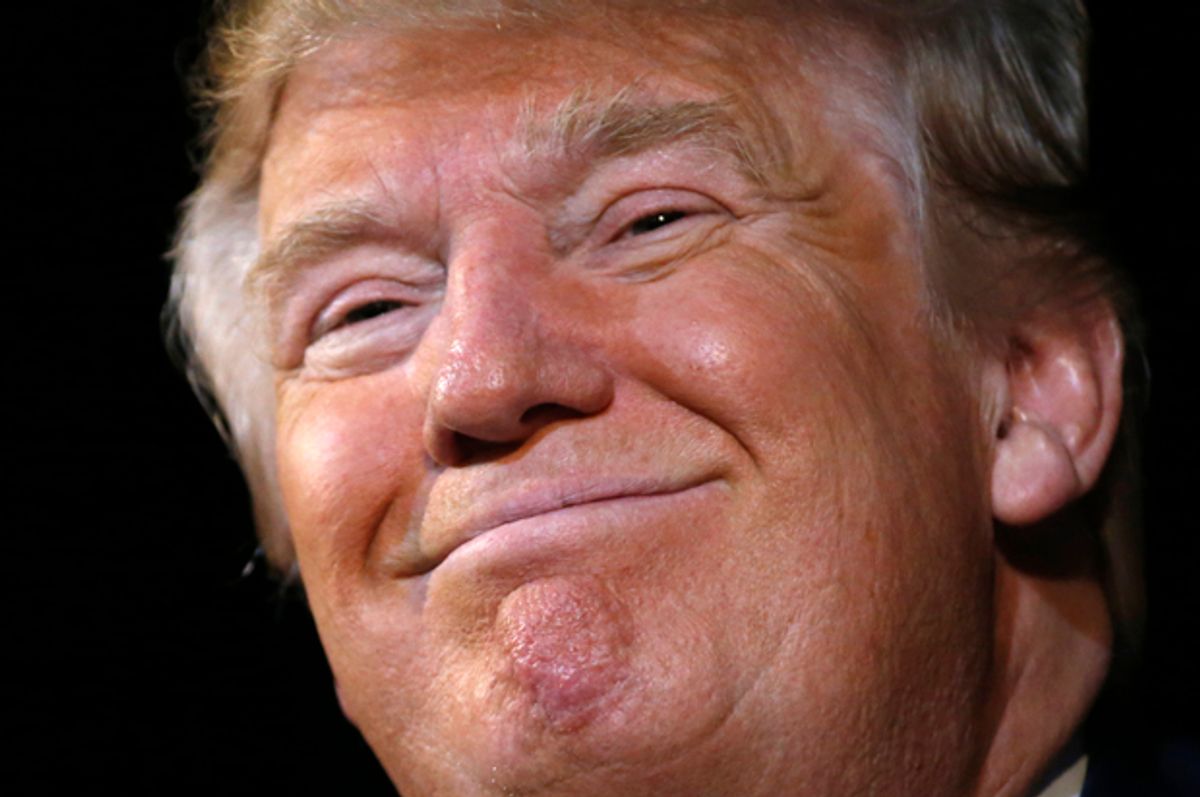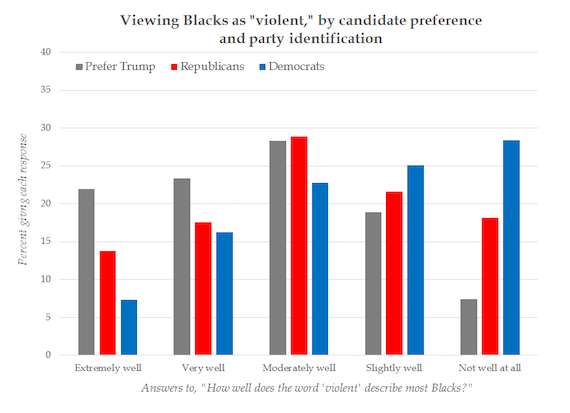As the idea of Donald Trump winning a major party nomination goes from ugly nightmare to increasingly real possibility, pundits are wondering why they didn’t see it coming. One reason is that many pundits, particularly on the right, have spent decades pretending that the ugly racial sentiments Trump panders to either don’t exist or are a minor aberrance on the radical fringe. Others have tried to blame economic conditions, an important factor that can’t fully explain the Trump phenomenon (there aren’t many poor Blacks rushing to vote Trump). Research suggests that racial animus is a much more powerful predictor of Trump support than “economic anxiety.” We argue that the core of the Trump phenomenon is decades of dog-whistle race-baiting made real: Trump is animating white racial fears in order to race toward the Republican nomination.
The newest American National Election Studies 2016 pilot survey provides an ideal way to explore the Trump phenomenon. It’s a 1,200 person internet survey performed by YouGov between January 22 and 28 of 2016 that includes incredibly detailed questions about race and racism. Though some are skeptical of online surveys, these concerns are overblown. Leading political scientists Stephen Ansolabehere and Brian Schaffner have shown that opt-in panel surveys are just as reliable as telephone surveys.
We examine the stereotyping variables which explore how many white respondents harbor and report negative stereotypes about Black people. The first question asks, “How well does the word ‘violent’ describe members of each group?” and includes Blacks, Whites, Hispanics and Muslims. The question is phrased the same way for “lazy.” To explore how Trump supporters differ, we examine three categories: Republicans, Democrats and Trump Supporters. (We don’t show independents or people who said “something else” separately; they’re mostly between Republicans and Democrats). The categories are not mutually exclusive: about half of Trump supporters are Republican, and half are independent or other (we don’t count the relatively small number of self-identified Democrats who said they would vote for Trump if they were to vote in a Republican primary, because he’s probably not their first choice)
Trump supporters are dramatically more likely to embrace racial stereotypes than the average Republican or Democrat. A full 45 percent of Trump supporters say that the word “violent” describes Blacks “extremely” or “very” well, compared with 31 percent of Republicans and 24 percent of Democrats. (Overall, 25 percent chose “extremely” or “very” well, as did 25 percent of all Whites and 19 percent of Black people, but the number of Black respondents in the survey is small.) On the other hand, 28 percent of Democrats said that violent describes Blacks “not well at all,” compared with 18 percent of Republicans and only 7 percent of Trump supporters. These results suggest that while far too many Americans of all parties hold destructive stereotypes about Black people, Trump’s supporters are far more likely to believe Black people are violent.
Yet, while many Trump supporters Black people as violent, it is these very supporters who have committed racially motivated violence. At a recent Louisville, Kentucky event, Trump supporters violently shoved a Black woman to cheers from the crowd. Last October Trump supporters spit on immigrant advocates. After a November incident when Trump’s followers attacked a Black man, Trump responded by saying, “maybe he should have been roughed up.”
Trump supporters were also far more likely to stereotype Black people as lazy. A full 38 percent of Trump supporters say “lazy” describes Black people “extremely” or “very well,” with one-fifth saying “extremely well.” (Overall, 20 percent of whites and 12 percent of Black people agreed.) Only a quarter of Republicans and less than a fifth of Democrats say that “lazy” describes Black people “extremely” or “very” well. Far too many, certainly, but far fewer than the number of Trump supporters.
The ANES survey also included a feeling thermometer test, which asks respondents to place their feelings for different groups on a scale from 0 (very cold) to 100 (very warm). The model below shows that as a positive feeling towards Blacks increases, individuals become more likely to identify as Democrat, but less likely to identify as Republican and support Trump. Note also the relationship is strongest for Trump support, which shows that negative feeling toward Blacks is most closely associated with his supporters. The model controls for age, gender and education.
These data make it incredibly difficult to deny that racial animus is driving support, not just for Trump, but for the Republican party in general. For decades, Republicans relied on the Southern Strategy to win the White House. By using coded racial appeals like complaints about “welfare queens,” “crack babies” and school busing programs, they pulled whites disenchanted with the Democratic embrace of civil rights. The media inadvertently aided the Republican Party by inflating and racializing violent crime and welfare. Political scientist Martin Gilens finds that, “network TV news and weekly newsmagazines portray the poor as substantially more black than is really the case.” The strategy worked. Economists Ilyana Kuziemko and Ebonya Washington find that racist Southern whites leaving the Democratic Party explains nearly all of the decline in Southern White support for Democrats between 1958 and 2000. Instead of calling out this racism, many centrist Democrats succumbed to it, for instance when The New Republic famously defended welfare reform by placing a Black mother with a baby on the cover. The unwillingness of most mainstream liberals to call out dog-whistle racism has let it fester. As leading scholar of race, Ian Haney-Lopez writes, “By staying silent on race, the left effectively disappeared: no one was arguing for direct responses to racial injustice.”
Many white liberals have laughed off the Trump phenomenon. One economist who chaired the Council of Economic Advisors told Politico “You want to quote me as saying ‘hahahahahahaha’?” when asked about Trump. But the Trump phenomenon isn’t quite as humorous for the people of color being violently attacked by newly empowered white supremacists. And there is increasing evidence that Trump has unleashed forces that will remain potent in American politics for decades. In a New Yorker article early during the rise of Trump, Evan Osnos describes Tony Hovater, a white nationalist who is running for city council in New Carlisle, Ohio and says that Trump’s success is what motivated him to run. Elsewhere in the article, Osnos writes,
All the men wanted to roll back anti-discrimination laws in order to restore restrictive covenants and allow them to carve out all-white enclaves. Henry, a twenty-six-year-old with cropped blond hair, said, “We all see some hope in Donald Trump, because it’s conceivable that he could benefit the country in a way that we feel would be helpful.”
White students in Des Moines, Iowa recently chanted “Trump! Trump!” after losing a game to Perry High School, which has a large Latino population. A Latino student from Perry said that it was fourth time that Trump’s name had been chanted at a basketball game. There have been reports of similar activities in Indiana. One mother took to Facebook to describe how two students in her son’s third grade class “decided to point out the ‘immigrants’ in class who would be sent ‘home’ when Trump becomes president.”
These new data show conclusively that racism is driving many whites to support Trump. It also suggests that the forces Trump released are not a joke; and the rise of white nationalism and violence against people of color confirm this. The rise of Trump isn’t just an indictment of the GOP, it’s an indictment of the unwillingness of mainstream commentators and politicians on both sides of the aisle to clearly call out racism. The problem is that now, it might be too late.
Philip Cohen is a sociologist at the University of Maryland who runs a blog called "Family Inequality." His twitter handle is @familyunequal.




Shares